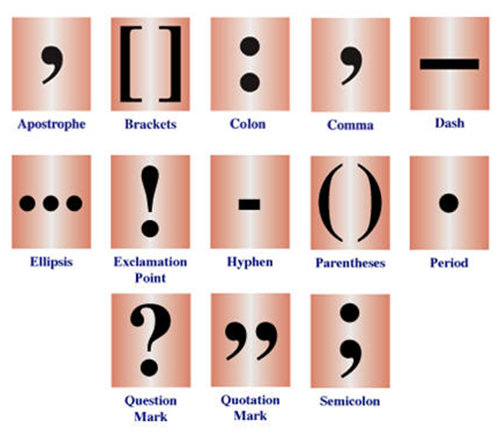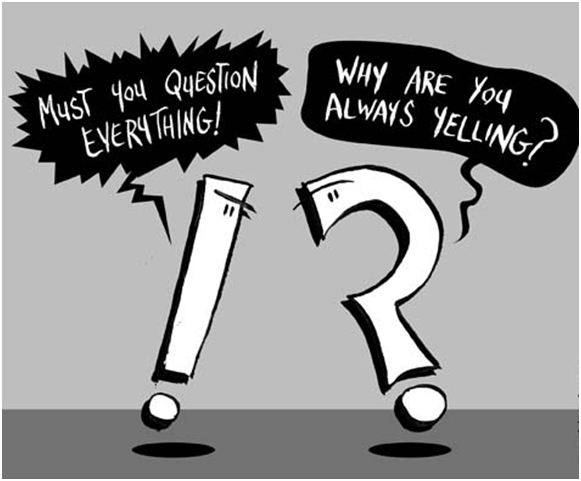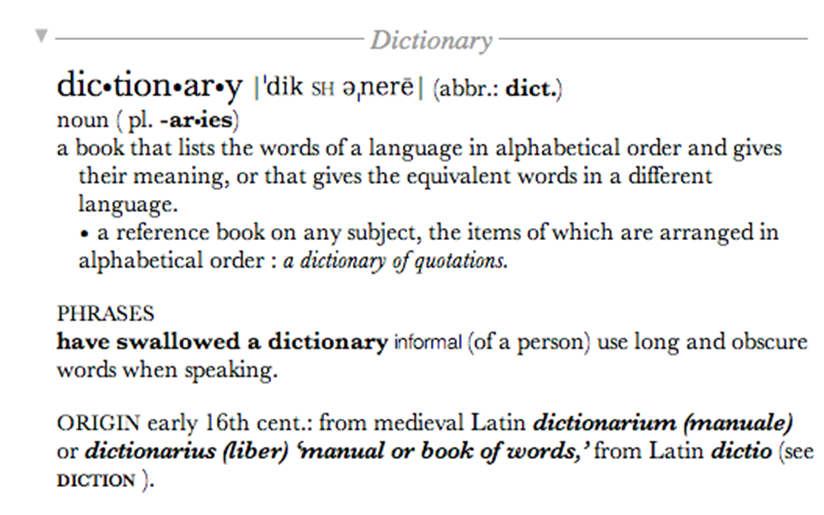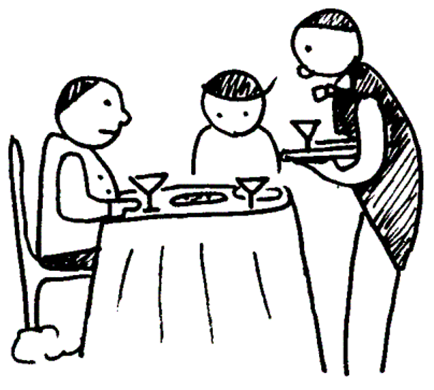How to Use Punctuation Correctly? Part - I
One of the most common and basic mistake that most of us commit while writing is the wrong use of punctuation marks. In today's modern age, when we are more fluent with the SMS language and the slang terms, we have forgotten the fundamentals of English like Punctuation. How many of us can proudly say we know A-Z about punctuation. Let's consider this article as your free English learning guide to punctuation.
Definition of punctuation
Wikipedia definition
"Punctuation marks are symbols that indicate the structure and organization of written language, as well as intonation and pauses to be observed when reading aloud."
The Oxford dictionary defines, "the marks, such as a full stop, comma, and brackets, used in writing to separate sentences and their elements and to clarify meaning."
In simple words, a set of symbols that are used in writing to guide a reader know the structure of a sentence. Punctuation guides us to change the rhythm, highlight a word in our speech and show the right expression. The common punctuation marks in English include the comma, apostrophe, period, quotation mark, exclamation mark, question mark, bracket, hyphen, dash, semicolon, ellipsis, and colon. Each punctuation mark has a specific purpose and use in the English language. Some may have varied meanings; based on the context they are used.
Punctuation rules 
End of the sentence punctuation
Every sentence that you write has to end somewhere. This ending punctuation mark can be a full stop or period, exclamation mark, question mark or an ellipsis. These punctuation marks terminate a sentence. The default terminal punctuation mark is a period or a full stop.
Ex: He lives in Chicago
The period is used here to finish the sentence without disclosing any other meaning.
Question mark: When you end a sentence in a question mark, you suggest an inquiry or an interrogatory remark.
Ex: What is your name?
The question mark is used to inquire a person's name.
Exclamation mark: It is used to suggest excitement or emphasis in a sentence.
Ex: I can't believe I am going to UK!
Ellipsis: It is a punctuation that is used when some part of a sentence is being omitted; usually used in quotes.
Ex: "[...] the President was excited as he laid out the growth policies in the agricultural sector."
Semicolon (;) vs. colon (:)
We all have studied the use of Semicolon while learning English grammar in our school. However, do you understand the difference between a colon and a semicolon? A semicolon is used when the writer wants to link two related, but independent clauses. There is always an argument, why not a period but a semicolon. Of course, if you think your sentence is too wordy, you can use a period, but avoid using it if you think it will create a strong break between the sentences.
Example: Several fast food restaurants can be found within the cities: London, England; Paris, France; Dublin, Ireland; and Madrid, Spain.
Now, let's learn the English lesson on the use of the colon. This punctuation mark is used to introduce a list. It can be used with ratios, titles and subtitles of books, hours and minutes.
Example: The concert begins at 21:45.
The following are our services:
We shall continue our free English learning session in our next blog on how to use English punctuation correctly. Till then, practice and observe the above punctuation marks to improve your English skills.
How to Structure English Sentences?
What is your motive behind learning English? If you ask this to a bunch of English students, at least 60% of them will give the same answer – in order to speak fluent English. And that is exactly what we aim to do – to help you learn and improve your spoken English.
We have been publishing blogs after blogs, filled with important and helpful tips for not just improving English, but to also help you understand the rules of grammar, syntax and how to form sentences. We hope that you have been benefitting ample from our efforts.
Today's blog is about common phrases used in English. As you must have learnt so far, there is a specific way in which sentences in English are formed, and certain phrases have a common start/ end. Once you understand the basic structure of forming sentences, it will be easier for you to build on it. Spoken English can be classified, roughly, into three categories – Formal, semi-formal, and informal. We will give you a rough idea of how sentences are formed under these three categories.
• Formal: These kinds of sentences are usually used in offices and other official setups. In such situations, you need to maintain certain decorum, not just in your conduct, but in your speech as well. Before we give you the basics of formal sentences, remember that words like 'please' and 'thank you' form an important part of the formal conversations. Formal phrases, usually, start with 'You ought to...', like 'You ought to complete this file by evening' or 'you ought to attend this meeting.' This will get the work done, without you sounding too imposing! For a negative sense, you should use 'You ought not to...'.
• Semi-formal: This is when you are speaking to your colleagues or with a client over lunch. You can relax a bit during semi-final conversations, but that does not mean that you should speak nonchalantly. A good way to start a sentence is, 'I think you should + infinitive'. For example, "I think you should increase the quotation' or 'I think you should start using the other software'. The negation of the same would be, 'I don't think you should + infinitive'.
• Informal: This is when you are at home, or speaking to your friends. In such situations, all you need to pay attention is to be grammatically sound, and you are sorted. You can form your sentences as you like; just make sure that you keep in mind the basic rules of syntax and grammar.
"How to improve English speaking?" if this question has been giving you sleepless nights, then you have come to the right place. eAgeTutor is the place for all of your English speaking and English fluency needs.
A Guide on How to Use a Dictionary Effectively
As a student who is learning English language, it is important that you understand how to use a dictionary. The English language has approximately 1 million words, of which an average speaker would be aware of about 60,000 words. You may be familiar with many words but would not know the exact meaning of them all. A dictionary is a handy tool that helps you improve your vocabulary day in and day out. Not only does it helps you deduce a word's meaning and spelling, but also helps you to effectively improve your English language.
Let us first look at the various information that you can find about a word in a dictionary.
• Spelling of the words and its plural form
• Syllables of a word
• Whether the word is capitalized or has an abbreviation
• The pronunciation of a word
• Different meanings a word has, its synonyms (same meaning) and antonyms (opposite meaning)
• History of the word
• An example of a sentence/expression showing the right usage of the word
• Prefixes and suffixes and their meanings
• Different words that can be derived from the main word
How to use a dictionary effectively?
You can improve your English fast, if you practice the habit of referring to a dictionary. Most of us refrain to carry a pocket dictionary as we consider it a time-consuming thing. However, if you know how to use a dictionary properly, it will take you less than a minute to find a word's meaning and refer the example. Let's look at the pointers that can help save your time.
Get yourself a quality dictionary – If you don't have a dictionary, make sure you buy a quality one like the Oxford dictionary.
Get familiar with its use – The user guidelines for each dictionary vary in approach. Therefore, the best way to go about it is to read the intro section and jot down how the details are arranged. Once you know the proper alphabetical order, you are well on your way to use the dictionary real fast.
For instance, if you're searching for a word "gnome", goes to the 'G' section and check the guide words, which are located in the upper corner of every page. These guide words are an indication on how close you are to finding your word. These guide words are real speed busters and must be checked to locate your word faster. Then, look for the second word 'n' to narrow down your search.
Got the word: Now, that you have found your word, what should you pay attention to?
• Definition of the word
• Different pronunciations – pay attention to the stress mark - ' - usually placed before a syllable to help you pronounce the word correctly.
• Capitalization
• Synonyms and antonyms
• Use of preposition, 'in', 'on' etc.,
• Phrases/idioms linked to the word
• Spellings in American, British and Australian English.
Improve your English speaking fluency by reading the word aloud from the dictionary, following the pronunciation guideline.
Hope this guide helps you to make proper use of your dictionary. Upgrade your English speaking skills while you have fun using a dictionary.
Conversations while Ordering Food
There are techniques that can help you learn, practice, and polish your English. These techniques usually are carried out in a classroom, among friends or individually. These techniques, more often than not, include exercises like reading a newspaper or a book loud, speaking in front of a mirror, practicing pronunciation and fluency, etc.
However, have you ever wondered how much these exercises really help? We are not saying that these exercises are of no use, they definitely are. If not for these exercises, how else would you even learn new words, phrases, and idioms? How else would you learn the principles of grammar and other rules of the English language? These exercises are definitely a stepping-stone for a person who wishes to learn and speak English. However, practicing English in a classroom, and speaking English in a real-life situation are two very different things.
As important as it is to practice English speaking, it is even more important to implement the same in real-life situations. This will help you in gauging how much you have learned and how much you need to improve, the areas you need to work on, and what are your problem areas.
This is why we bring to you a series on 'situational conversations'. This is where we give you a real-life situation and the type of conversation you can encounter. While no one can predict how a conversation shapes, there are a few standard sentences exchanged in certain standard situations.
The first part in our series is:
Conversation in a restaurant while ordering food.
Waiter: Welcome to FoodRUs, what kind of table would you like, ma'am.
Customer: A table for two, please.
Waiter: This way, ma'am.
(After you are seated)
Waiter: Here are your menus. What kind of water would you prefer, bottled or mineral water?
Customer: Thank you. Mineral water should be fine. Make it chilled, please.
Waiter: Here is your water, ma'am.
Customer: Thank you.
Waiter: Are you ready to order, ma'am?
Customer: Yes, we would like to have pasta with sautéed vegetables and spicy chicken soup. We will order our main course later.
Waiter: Anything else ma'am, as a side dish?
Customer: This should be fine for now.
Waiter: Here is your pasta and here you go, your soup. Enjoy your meal. Bon Appetite.
So, as you can see, when ordering food in a restaurant, keep the conversation short, clear, and crisp. It is also important to be on your best manners when dealing with the waiter. And smile – do not forget to smile. Going to a restaurant means that you are about to have a good food experience, and a good, polite conversation will set the right mood!
For more such valuable and handy spoken English tips and tricks, it is vital that you sign up with our online English speaking classes. Fluent English speaking takes practice and patience, and with the right guidance, you can surely improve spoken English. Learning and speaking English is a requisite for excelling in today's world, and with the help of the right English classes, you can achieve the excellence in English speaking.




